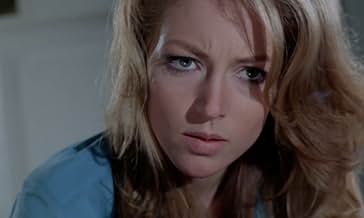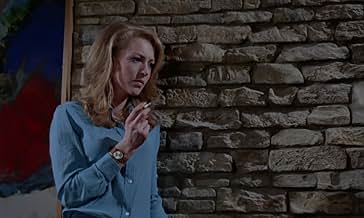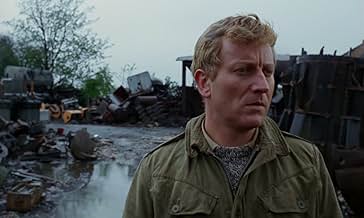CALIFICACIÓN DE IMDb
6.9/10
2.2 k
TU CALIFICACIÓN
Agrega una trama en tu idiomaA group of British criminals plan the robbery of the Royal Mail train on the Glasgow-London route.A group of British criminals plan the robbery of the Royal Mail train on the Glasgow-London route.A group of British criminals plan the robbery of the Royal Mail train on the Glasgow-London route.
- Dirección
- Guionistas
- Elenco
- Premios
- 1 premio ganado en total
Patrick Jordan
- Freddy
- (as Patrick Jordon)
Kenneth Farrington
- Seventh Robber
- (as Ken Farrington)
Roger Booth
- Detective
- (sin créditos)
Ron Charles
- Seaman
- (sin créditos)
Opiniones destacadas
This is true British gangster filming at its best.
The opening robbery and car chase, from Hatton Garden around central London and out to Maida Vale, is utterly brilliant and that's years before the French Connection or anything like that. Peter Yates was brilliant. In fact, if they re-make any British gangster film these days it should be Robbery, not Get Carter or anything like that.
The music is utterly brilliant, too. Johny Keating should be up there with the likes of John Barry, John Williams, etc. He seems to have done virtually nothing after this film.
Even the faked scenes of the train robbery itself are great despite the London-Glasgow express train really being another train on a branch line travelling at about 30 mph.
They could've made a sequeal to this, too, with the legendary and fantastic Stanley Baker shown in the New World. Same goes for the late Barry Foster.
The opening robbery and car chase, from Hatton Garden around central London and out to Maida Vale, is utterly brilliant and that's years before the French Connection or anything like that. Peter Yates was brilliant. In fact, if they re-make any British gangster film these days it should be Robbery, not Get Carter or anything like that.
The music is utterly brilliant, too. Johny Keating should be up there with the likes of John Barry, John Williams, etc. He seems to have done virtually nothing after this film.
Even the faked scenes of the train robbery itself are great despite the London-Glasgow express train really being another train on a branch line travelling at about 30 mph.
They could've made a sequeal to this, too, with the legendary and fantastic Stanley Baker shown in the New World. Same goes for the late Barry Foster.
This movie is well made, with a typical trade mark approach by the crime picture craftsman Peter Yates was. There's no big bang, no unnecessary violence, just the pace that tells the story. This method Yates used successfully in his Hollywood years building up a plot without too much distraction from standard story fillers, which produced great films such as "Bullitt" and "The Friends of Eddie Coyle". In this one Yates gives the audience just enough to paint a picture of a big time robbery, with minimal character development but enough to serve the purpose.
A must see for the fans of this classic director, not great but rather good crime movie that they don't make any more.
A must see for the fans of this classic director, not great but rather good crime movie that they don't make any more.
A gang of crooks plan a big score and use other smaller robberies as a means of financing it. Clearly inspired by the Great Train Robbery of the 1960's, although the facts are shifted - maybe made for legal reasons?
This is the kind of film that I loved as child. And still do. Live-for-today criminals that stop at nothing to get their hands on the loot and heaven help anybody that gets in the way. While having the plus of the robbery and the usual gang of rent a villains it does minor variations on the expected while not leaving the well trodden track.
The car chase through central London is one of the best things here and inspired many impersonations. Indeed it is probably the first homicidal chase through a big city seen on screen.
(The chase in Bullet is a complete rip-off - although Peter Yates directed this as well!)
As another viewer noticed the dialogue is dated (no swearing!) and the thing lacks a clear hero and villain. All-in-all like watching one of the better episodes of The Sweeney (a UK TV series) and a good guide to London -- as it was back in the Swinging Sixties.
This is the kind of film that I loved as child. And still do. Live-for-today criminals that stop at nothing to get their hands on the loot and heaven help anybody that gets in the way. While having the plus of the robbery and the usual gang of rent a villains it does minor variations on the expected while not leaving the well trodden track.
The car chase through central London is one of the best things here and inspired many impersonations. Indeed it is probably the first homicidal chase through a big city seen on screen.
(The chase in Bullet is a complete rip-off - although Peter Yates directed this as well!)
As another viewer noticed the dialogue is dated (no swearing!) and the thing lacks a clear hero and villain. All-in-all like watching one of the better episodes of The Sweeney (a UK TV series) and a good guide to London -- as it was back in the Swinging Sixties.
An extended near-wordless sequence, punctuated by Johnny Keating's tension-building staccato music, follows a cleverly planned diamond heist. Followed by an exciting high-speed car chase through the streets of London, the opening scenes of Peter Yates "Robbery" illustrate cinematic story-telling at its best. Although following the diamond job, the film slows to a more sedate pace, nevertheless, director Yates keeps the focus on plot and detail with a minimum of filler. After the diamond robbery, Stanley Baker as Paul Clifton re-groups his men, and, with added members, they buy into another robbery, which he promises will be the big one and net three or four million pounds. The target is the Royal Mail Train on the eve of a three-day bank holiday. Clifton's planning is meticulous and includes springing Robinson, played by Frank Finlay, from prison with an all too easy diversion ploy. While Baker and his boys proceed, police inspector Langdon, played by James Booth, heads an investigation into the diamond heist, which hones in on Clifton and other members of Baker's group.
Cutting between the robbery plans, the inspector's work, and a brief peek at Clifton's domestic life, the film is an excellent thinly-veiled dramatization of the famous British great train robbery, which took place in 1963, four years before the film was made. The scenes of domestic crisis between Baker and Joanna Pettet as his wife are probably the film's weakest; Pettet has little to do, and her presence seems little more than a gratuitous female token. However, the screenplay by Edward Boyd, Peter Yates, and George Markstein is tight otherwise, and the shift between the plotters and the police adds suspense, although viewers may identify with the unarmed robbers and cheer them on. Peter Yates's direction is top notch, although he subsequently topped the opening car chase with a more famous one in "Bullit." Featuring good performances throughout from Baker, Booth, Finlay, and Barry Foster, "Robbery" is well directed, well shot by cinematographer Douglas Slocombe, and provides excellent entertainment.
Cutting between the robbery plans, the inspector's work, and a brief peek at Clifton's domestic life, the film is an excellent thinly-veiled dramatization of the famous British great train robbery, which took place in 1963, four years before the film was made. The scenes of domestic crisis between Baker and Joanna Pettet as his wife are probably the film's weakest; Pettet has little to do, and her presence seems little more than a gratuitous female token. However, the screenplay by Edward Boyd, Peter Yates, and George Markstein is tight otherwise, and the shift between the plotters and the police adds suspense, although viewers may identify with the unarmed robbers and cheer them on. Peter Yates's direction is top notch, although he subsequently topped the opening car chase with a more famous one in "Bullit." Featuring good performances throughout from Baker, Booth, Finlay, and Barry Foster, "Robbery" is well directed, well shot by cinematographer Douglas Slocombe, and provides excellent entertainment.
Robbery is directed by Peter Yates and adapted to screenplay by Yates, Edward Boyd and George Markstein from The Robber's Tale written by Peta Fordham. It stars Stanley Baker, James Booth, Frank Finlay, Joanna Pettet, Barry Foster, William Marlowe, George Sewell and Clinton Greyn. Music is by Johnny Keating and cinematography by Douglas Slocombe.
As tough as steel toe capped docker boots, Robbery is a fictionalised take on the Great Train Robbery of 1963 that saw the London to Glasgow mail train stripped of its £2.6 million hold. It was a robbery seen as daring and near genius in its meticulous planning and execution. Coming out just four years after the real event, Peter Yates' film takes the skeleton facts of the real robbery and builds a dramatic carcass around it.
Film is structured in three stages, firstly is a scintillating diamond robbery that introduces us to some of the major players in the train robbery to follow. This is fronted by an adrenalin pumping car chase that stands as one of the finest ever put to celluloid, kinetic and with inventive use of camera work, it's set to almost no dialogue and is car choreography of the highest order. Steve McQueen was so impressed he promptly arranged to have Yates summoned to Hollywood to direct Bullit.
The second part of the picture and the meaty middle section of the tale, concentrates on the movers and shakers in the robbery. The planning of the event, the gathering of various criminal London factions, their meetings, arguments, frets and worries, even a scenario that sees ringleader Paul Clifton (Baker) arrange to have a currency expert broken out of prison. All the time while this is happening, as the various crooks move about various London locations such as bars, clubs, football grounds and abodes etc, we are also following the police side of things. The kicker here is that the police, led by Inspector George Langdon (Booth), know that something big is being planned, and by who, but they don't know what and have to bite their nails waiting for a break or for the event to actually happen!
Finally the third part is the robbery itself and the aftermath involving the robbers hiding out, scattering to the wind as the cops close in. The robbery is edge of the seat brilliance, cunning in its execution and filmed with such gritty realism it really grabs the attention wholesale. The climax played out at a disused airfield is also exciting and such is the fact that previously we have been firmly tuned into the main characters on both sides of the law, we are fully immersed into what will become of them all.
Yates and his cast are on fine form, with Baker and Booth excellent, in fact the film positively bristles with British beef at times! Slocombe's photography strips it back to basics, suitably so to imbue that documentary feel, and Keating's score thunders away like a criminal accomplice at times. While fans of 60s London as a period backdrop can't fail to feel well fed after film's end. Pettet's wife of Clifton angle feels under nourished, and the whole middle section inevitably fails to sustain the tempo created by that exhilarating first quarter of film, but small irritants only they be. For Robbery is a British Bulldog of a movie, its biceps bulging, its brain clicking into gear, in short, it's a cracker! 8/10
As tough as steel toe capped docker boots, Robbery is a fictionalised take on the Great Train Robbery of 1963 that saw the London to Glasgow mail train stripped of its £2.6 million hold. It was a robbery seen as daring and near genius in its meticulous planning and execution. Coming out just four years after the real event, Peter Yates' film takes the skeleton facts of the real robbery and builds a dramatic carcass around it.
Film is structured in three stages, firstly is a scintillating diamond robbery that introduces us to some of the major players in the train robbery to follow. This is fronted by an adrenalin pumping car chase that stands as one of the finest ever put to celluloid, kinetic and with inventive use of camera work, it's set to almost no dialogue and is car choreography of the highest order. Steve McQueen was so impressed he promptly arranged to have Yates summoned to Hollywood to direct Bullit.
The second part of the picture and the meaty middle section of the tale, concentrates on the movers and shakers in the robbery. The planning of the event, the gathering of various criminal London factions, their meetings, arguments, frets and worries, even a scenario that sees ringleader Paul Clifton (Baker) arrange to have a currency expert broken out of prison. All the time while this is happening, as the various crooks move about various London locations such as bars, clubs, football grounds and abodes etc, we are also following the police side of things. The kicker here is that the police, led by Inspector George Langdon (Booth), know that something big is being planned, and by who, but they don't know what and have to bite their nails waiting for a break or for the event to actually happen!
Finally the third part is the robbery itself and the aftermath involving the robbers hiding out, scattering to the wind as the cops close in. The robbery is edge of the seat brilliance, cunning in its execution and filmed with such gritty realism it really grabs the attention wholesale. The climax played out at a disused airfield is also exciting and such is the fact that previously we have been firmly tuned into the main characters on both sides of the law, we are fully immersed into what will become of them all.
Yates and his cast are on fine form, with Baker and Booth excellent, in fact the film positively bristles with British beef at times! Slocombe's photography strips it back to basics, suitably so to imbue that documentary feel, and Keating's score thunders away like a criminal accomplice at times. While fans of 60s London as a period backdrop can't fail to feel well fed after film's end. Pettet's wife of Clifton angle feels under nourished, and the whole middle section inevitably fails to sustain the tempo created by that exhilarating first quarter of film, but small irritants only they be. For Robbery is a British Bulldog of a movie, its biceps bulging, its brain clicking into gear, in short, it's a cracker! 8/10
¿Sabías que…?
- TriviaIt was the realistic car chase through the streets of London in this picture, that led to director Peter Yates doing another car chase in San Francisco a year later. Steve McQueen personally wanted Yates for what turned out to be his highest grossing film Bullitt (1968).
- ErroresWhen the traffic warden puts the gas canister in the car, a white cable can be seen draping from the inside of the door and this is seen to be connected to the device as he removes it from his bag. There is no sign of the cable in the following close-up shot from his point of view.
- Citas
Paul Clifton: We're talking about millions of pounds now. We're talking about road blocks, car searches, house raids, shakedowns. They'll know who pulled the job. Without the money, they can't prove anything.
- ConexionesFeatured in Film Review: Film Review (1967)
Selecciones populares
Inicia sesión para calificar y agrega a la lista de videos para obtener recomendaciones personalizadas
- How long is Robbery?Con tecnología de Alexa
Detalles
- Fecha de lanzamiento
- País de origen
- Idioma
- También se conoce como
- Robbery
- Locaciones de filmación
- Leyton Stadium, Brisbane Road, Leyton, Londres, Inglaterra, Reino Unido(Paul Clifton plans the train robbery with Frank, Dave, Ben and Don during a football match)
- Productoras
- Ver más créditos de la compañía en IMDbPro
Contribuir a esta página
Sugiere una edición o agrega el contenido que falta

Principales brechas de datos
By what name was Robo (1967) officially released in India in English?
Responda



































